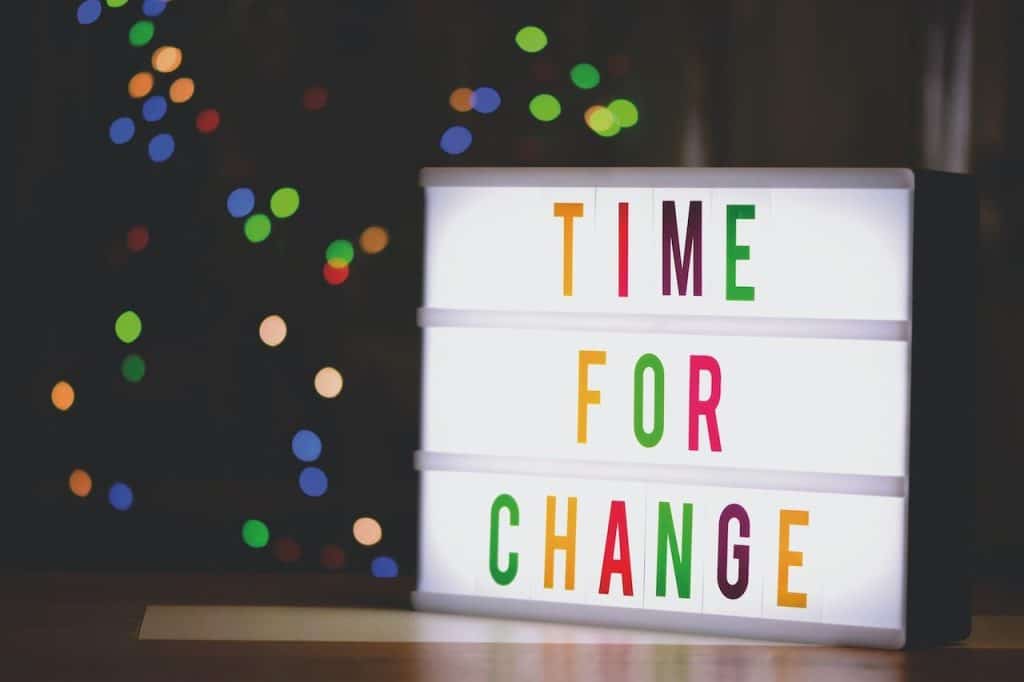16 ways to make a positive change as a freelancer

Freelance life may sometimes not feel like the dream you had thought it’d be. Maybe you feel stuck in your business journey or are disheartened about the general state of things right now. The cost of living and climate crises are just two of the many issues affecting so many of us.
While there’s no magic pill to create positive change in your life or your business, here are a few tips that could help you.
Before changing anything in your professional or personal life, take time to consider what you care most strongly about. What are your core values and priorities? You don’t have to do everything on this list (and certainly not all at once! 🙂).
Help others

Not only is it a nice thing to do, but helping family, friends, colleagues or strangers improves your own mood and wellbeing, too. Here are some ideas to get you started:
1. Support good causes
You could make one-off donations to a different cause each month or partner with a specific charitable organisation. Alternatively, get inspiration and ideas from kindness apps.
2. Volunteer your services
Do you have spare time in your busy freelance life? Consider working pro bono for good causes close to your heart. I’ve previously found a volunteering placement through Reach, but there are many other opportunities out there — both locally and nationally.
Do your research, so you can be sure you send your CV and other personal details to trustworthy organisations. (Fake job ads are, sadly, not uncommon in the online world.)
3. Network and recommend others
I recently discovered ROBIN, an Oxfordshire network of businesses, social enterprises, and charities. It runs regular face-to-face networking sessions in my area. Chances are, there will be similar organisations near you.
Of course, you could also network online and build friendly relationships with fellow freelancers and small businesses. Social media can be great for this. Once you know each other well and can honestly recommend their services, do! Word of mouth really helps your colleagues and SMEs.
4. Market more ethically
Fed up with dodgy marketing and sales tactics? You’re not alone. I recommend learning about the ethical move’s marketing pledge and listening to the Duped podcast.
More ethical marketing tactics will not only be better for your target audience, but also for your conscience.
5. Become a mentor
Your local LEP or professional association (e.g. CIOL, CIM, etc.) is likely to run a B2B mentoring programme. You could also try mentorsme.co.uk. You’ll be able to advise more inexperienced freelancers and small business owners, which can be very rewarding.
Be kind to yourself
You can’t pour from an empty cup, so take care of yourself! The following actions should get you started.

6. Make time for more exercise
Desk exercises, yoga videos, meditation sessions and fitness workouts on Netflix or YouTube are free and will boost your mood and physical health. No more excuses!
You don’t need to be perfect — baby steps are fine. Just get out of your comfort zone at least a few times a week.
7. Eat and drink well (and more sustainably)
There are many guides on this, so just a few ideas here:
- Drink more water, and less (or no) alcohol. In the UK, tap water is as good as bottled water — and often better. Plus, it’s cheap and best for the environment. Did you know soft drinks and fruit juice “are the third-biggest contributor of dietary greenhouse gas emissions”? Me neither, but I’m glad I switched to water years ago.
- Eat healthier snacks and main meals. The less processed, the better.
- Check out what the Association of UK Dietitians considers to be a more sustainable diet. I’ve had an interesting discussion about this on LinkedIn recently. It may be more complicated than just favouring plant-based foods and buying locally, but we’ll need to begin somewhere, don’t we?
8. Challenge negative thoughts
Freelancing and running a small business can be tough. The cost-of-living crisis, the climate emergency, the rise of AI and the state of global politics don’t help. However, don’t get despondent, and don’t start doubting yourself or your skills. Maybe it’s time to invest in CPD, re-skill or rethink certain strategies. Treat yourself with as much kindness as you’d show your friends and colleagues. You wouldn’t belittle them and their achievements, would you?
Take steps to challenge negative thinking and anxiety, and don’t hesitate to ask for help from professionals if you feel low. Your GP or mental health charities like MIND or Anxiety UK are a good first point of contact if you’re based in the UK.
9. Read slow, solutions-focused news
Change the world by changing your media diet! According to author Jodie Jackson, it’s possible. She suggests switching from the daily roller coaster ride of (often biased) news headline consumption to reading well-researched, solutions-focused and in-depth articles on a weekly basis. (Find a free summary of the book on Uptime.)
Here are some examples of Slow Journalism:
Of course, we mustn’t bury our heads in the sand. We need to learn about topics that matter! But: the “Breaking News” culture isn’t healthy and focuses more on selling the latest disaster story than solutions.
10. Take breaks and set boundaries
According to a recent survey by SimplyBusiness.co.uk, the majority of self-employed persons (73%) take off fewer than 20 days a year. And: one-third of the 700 people interviewed worked over 46 hours per week. To avoid burnout and protect your mental and physical health, plan regular breaks and switch off completely when you can.
Being glued to your smartphone isn’t a good idea, either. Use your phone’s free inbuilt tools to reduce your screen time or try a few of the many productivity apps out there, e.g. Freedom. (I subscribe to Freedom myself and can recommend it. I just have to remember to switch it on!)
Setting boundaries is crucial. Make sure you tell your clients when you don’t work. Managing expectations will help both of you in the long run. I’m not available in the late afternoons or evenings, for example.
Help save the planet
Last but not least, many of your positive actions will also be better for the environment. Here are a few ideas!

11. Follow the 5 Rs: Refuse, Reduce, Reuse, Repurpose, Recycle
You haven’t heard of the 5Rs before? Here’s a quick summary:
- Refuse: don’t buy or get unnecessary products, especially if they harm the environment. (That includes freebies!)
- Reduce your consumption. I find The Minimalists‘ website and podcast very helpful here.
- Reuse: items such as water bottles, batteries, packaging material and even certain printer cartridges can be reused. Second-hand office furniture and equipment are perfectly good, too.
- Repurpose: use old printing paper or envelopes for note-taking, for instance.
- Recycle: only recycle if you can’t reuse or repurpose an item. Again, you can recycle batteries, some printer cartridges, phones, etc.
For more inspiration, read this article.
12. Join green and ethical business memberships
If you feel strongly about changing to more sustainable and ethical business practices, there are many great memberships to help and inspire you. Here are just some examples:
- Ethical Hour
- The Ocean Network
- Women in Sustainability
- The Ethical Move
- Impact-Driven Community
- ROBIN Network (Oxfordshire only)
I used to pay for tree-planting initiatives on a monthly basis, but I realised it’s a complex subject and not necessarily the best solution.
13. Use eco-friendly training apps
Try EcologiZero, a free new carbon footprinting tool for businesses. Simply answer a few questions, and you’ll know how high your business footprint is and what you can do to tackle it. For a more precise calculation, connect your accounting app* to EcologiZero, and the impact of your entire supply chain will be automatically considered, too. (* Currently, this only works if you use Xero.)
Another free app you may enjoy using for both business and private use is Ailuna, which helps you develop eco-friendlier habits.
14. Lower your digital footprint (green hosting, email storage, etc)
It’s not just about the usual CO2 culprits. For example, every Google search produces ca. 7g of CO2. (Multiply this by 8.5 billion searches per day! 😬)
The Business Standard estimates that working on a computer all year “is equal to the energy consumed by 80 low-energy light bulbs”.
Add to this your email storage, website hosting, online meetings, streaming: it’s all digital pollution.
There are things you can do, however:
- Check the footprint of your web pages and find out how to slim down your site.
- Use a “green” web host (I can recommend Krystal for UK businesses).
- Delete old emails and spam.
- Switch on dark mode when you can.
- Turn off your camera during Zoom meetings if possible.
- Quit browsing or aimlessly scrolling through your apps. Subscribe to Freedom and do other things!
- Only get a new phone or laptop if your old one breaks. (Most of their carbon footprint stems from the manufacturing process.)
- Buy second-hand, refurbished products.
- Turn off all your electronic devices after use.
15. Take carbon literacy training
You may think you know a lot about the causes of climate change already. When I took a 2-day formal carbon literacy training course last year, I was surprised how much I didn’t know. Why not enrol in one of the many Carbon Literacy classes offered online and in person? They’re not expensive, and you’ll get many practical tips for your own life (private and business).
Read more information about my experience here.
16. Stay frugal & avoid unethical businesses
I’m a big fan of simple living — also in my freelance life. This means going back to basics, looking for the best deals, and generally avoiding excessive spending on unnecessary products and services.
Do you really need the latest gadget or course? To find out, put your latest “shiny new thing” in your virtual shopping basket and leave it there for at least 3 days, ideally much longer. If you still want it then, go ahead (after having checked whether you can get it cheaper or second-hand elsewhere.)
Frugality isn’t only good for your wallet; it’s usually more eco-friendly, too. (Unless you continue to use a fridge from the 1970s.)
Although it costs something, I thoroughly recommend subscribing to the Ethical Consumer Magazine. Even if you can’t afford the most ethical product or service, you definitely should avoid or boycott businesses that are massive polluters, tax avoiders, knowingly use sweatshops or child labour, and so on.
Summary: enjoy your positive changes!
You can do much to improve your private life and the business world in general. Just start with one or two things in the above list and let me know how you get on. And, if you have any other great ideas to share, tag me on LinkedIn!
PS. I’m using fewer images in my blog posts these days to reduce my digital footprint.












